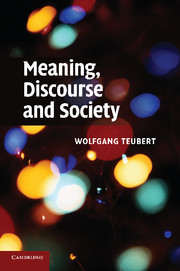Book contents
- Frontmatter
- Contents
- Acknowledgements
- Introduction
- Part I Meaning, the mind and the brain
- Part II Discourse and society
- 8 Language as discourse
- 9 Society presupposes language, and language presupposes society
- 10 A closer look at oral societies
- 11 Differences between oral and literate societies
- 12 Empirical linguistics deals only with recorded language
- 13 Meaning, knowledge and the construction of reality
- 14 The language of the scientific experimental report
- 15 Diachronicity, intertextuality and hermeneutics
- 16 Meaning and the interpretation of a haiku
- Conclusion
- Bibliography
- Index
15 - Diachronicity, intertextuality and hermeneutics
Published online by Cambridge University Press: 04 August 2010
- Frontmatter
- Contents
- Acknowledgements
- Introduction
- Part I Meaning, the mind and the brain
- Part II Discourse and society
- 8 Language as discourse
- 9 Society presupposes language, and language presupposes society
- 10 A closer look at oral societies
- 11 Differences between oral and literate societies
- 12 Empirical linguistics deals only with recorded language
- 13 Meaning, knowledge and the construction of reality
- 14 The language of the scientific experimental report
- 15 Diachronicity, intertextuality and hermeneutics
- 16 Meaning and the interpretation of a haiku
- Conclusion
- Bibliography
- Index
Summary
Hermeneutics is the art of interpreting texts. Its name is derived from the god Hermes. In Cratylus, Socrates describes the connection between Hermes and interpretation:
I should imagine the name Hermes has to do with speech, and signifies that he is the interpreter (ermeneus), or messenger, or thief, or liar, or bargainer: all that sort of thing has a great deal to do with language.
(Translation: Benjamin Jowett; taken from the Project Gutenberg online version)Truth is not an issue closely associated with Hermes' character. He is more concerned with the meaning attached to a message. A text, a text segment, a phrase or a simple lexical item, means. When we ask what it means, we expect to be given a paraphrase of the text, an interpretation of it. If I ask ten people, I will probably be told ten different paraphrases. If I want to know what a Chinese sentence means, I have to ask for a translation. Ten different translators will give me ten different translations. Translations are in this sense like interpretations. There will never be the one and only, the perfect translation. Translations and interpretations have to be negotiated, and it does not matter if a consensus is reached or not. There is no mental mechanism that generates the one and only translation in a computational process with a predefined outcome. Translations and interpretations are the contingent results of collaborative efforts of discourse communities, an English Literature class or a community of bilingual speakers.
- Type
- Chapter
- Information
- Meaning, Discourse and Society , pp. 199 - 214Publisher: Cambridge University PressPrint publication year: 2010
- 1
- Cited by

